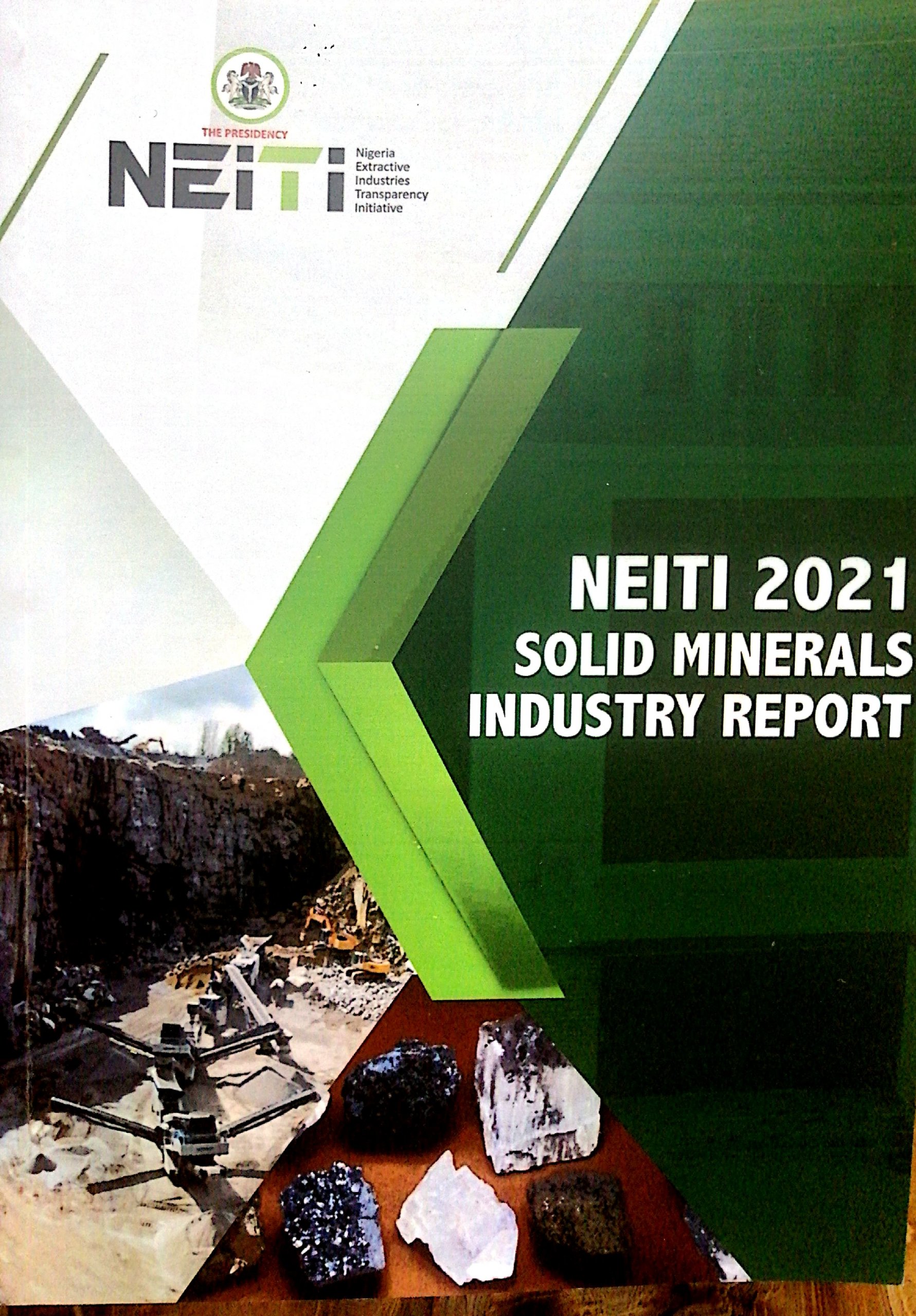Despite endowment with an array of solid mineral deposits in different part of the country, Nigeria earned a paltry N814.59 billion from the sector in 15 years between 2007 and 2021, the latest Nigerian Extractive Industry Transparency Initiative (NEITI) industry audit report has revealed.
At the formal launch of the 2021 NEITI Solid Minerals Industry Audit Report on Monday in Abuja, the Executive Secretary of NEITI, Orji Ogbonnaya Orji said the country realised about N193.59 billion only in 2021.
Orji said this was the highest earning to be recorded over the period and since the commencement of reconciliation of payments by companies and receipts by government in the sector.
Details of the report showed that the 2021 earnings grew by about ₦60.32 billion, or 51.89%, when compared with the 2020 revenue figure of ₦116.82billion.
Nigeria is endowed with the largest production volumes of Granite, Limestone, Laterite, Clay and Sand during the year under review.
Orji said the positive performance trend reflected a continued growth in the sector over the past five years, although still abysmal considering that out of the N6.62 trillion total government revenue in 2021, the sector barely contributed 2.6% only.
The contribution of the solid minerals sector to the country’s total export value in 2021 was a paltry 0.24%.
At the presentation of the report witnessed by the representatives of the Secretary to the Government of the Federation, Speaker of the House of Representatives and some lawmakers from the National Assembly, Orji said the 2021 Solid Minerals report reviewed, ascertained, reconciled and reported all revenues and investment flows from the solid minerals sector to the Federation Account.
He said the report, which is NEITI’s 12th, covered actual payments by 1,214 companies operating in the sector and receipts by three government agencies, namely the Federal Inland Revenue Service (FIRS), the Mining Cadastre Office (MCO) and the Mining Inspectorate Department.
While the FIRS collected the bulk of the revenue of about N169.52B billion, the report said MCO realised about N4.3 billion, and MID about N3.62 billion.
Apart from reviewing the quantities of minerals produced, utilised and exported from the sector, Orji said NEITI reconciled the physical/financial transactions and undertook special verification on some processes.
He said the report also covered balances payable/receivable from financial inflows, tracked the funds and utilisation meant for the development of solid minerals in the country.
The funds covered the Natural Resources Development Fund, Solid Minerals Development Fund (SMDF), Ministry of Mines and Steel Development’s (MMSD) MinDiver Programme and Solid Minerals Development Funds under the Small and Medium Industries Equity Investment Scheme (SMIEIS) operated through the Bank of Industry (BOI), the emerging issues of beneficial ownership and contract transparency as well as observations and recommendations for informed policy decisions and implementation.
A breakdown of the revenues showed that the total revenue that accrued to the government since 2007 stood at about N818.04bn, describing it as significantly low compared to the huge economic potential of the sector.
On Production, the NEITI Chief said the solid minerals report disclosed that the total volume of solid minerals used or sold in 2021 was about 76.28 million tons with a royalty payment of N3.57billion.
Of this volume, Dangote Plc accounted for the highest production in the year, with a total production of 28.8 million tons, BUA and Lafarge accounted for 8.4 and 4.3 million tons respectively, while Zeberced accounted for 3.3 million tons.
In terms of contributions by the States, the report said Ogun recorded the highest production, with a total of 17.5 million tons, followed by Kogi state with 16.3 million tons and Edo with 8 million tons, while the least production volume was recorded in Borno with 25,500 tons.
The report noted increases in the number of licences issued within the period, with a total of 2,045 exploration licences issued, translating to about 840, or 62.79% increase; Small Scale Mining Lease (SSML) 771, Quarry Lease 255, Reconnaissance Permit 139 and Mining leases 40.
On Export, NEITI said total minerals exported in 2021 was 142.54 million tons with a Free on Board (FOB) value of $101.29 million, showing an increase of 138.57% from the $42.46 million reported in 2020 report.
The Ebonyi state-based First Patriot Nigeria Limited accounted for 44.26% of the total export value, with China identified as the principal destination of Nigeria’s mineral exports, accounting for 97% and 88% of the export volume and value.
Other destinations for Nigeria’s minerals, the report said, included Malaysia, Korea, Thailand, UAE, etc.
Solid minerals export, the report said should be encouraged, as it facilitated international trade and stimulated domestic economic activities by creating employment, enhancing production and increased revenue generation.
While observing some improvements in the contribution of the solid minerals sector to the economy, the NEITI report said the sector contributed about 0.63% to the country’s gross domestic product (GDP). compared to 0.45% in 2020 and 0.26% in 2019.
Also, the report identified a total of N1.06 billion as outstanding company liability to the government within the period as a result of the failure of some of the companies to pay their annual service fees for the respective mineral titles.
In June 2021, the report said about N7.94 billion was distributed to the three tiers of government from the Solid Minerals Revenue Account based on the mineral revenue sharing formula, with a balance of N5.67 billion left as at 31st December 2021.
While the Federal government got N3.64B billion, states received N1.85 billion and local government councils N1.42 billion, with 13% derivation share of N1.03 billion distributed among the benefiting states.
The NEITI report said that while there was an increase of 85% in the number of artisanal miners operators, from 1,273 in 2020 to 2,336 in 2021 across the six geo-political zones of the country, there were no commensurate data in the areas of production, royalty payments, exports, etc. to support this increase in operators.
Similarly, employment data from the sector showed that the sector’s contribution to employment in 2021 was about 25,618, with 596 expatriates, while 25,022 were Nigerians.
On gender, the report said about 92% of jobs were occupied by men, while women occupied 8% with no physically challenged person employed in the sector in 2021.
On Community Development Agreement (CDA) and Environmental Expenditure, the Report disclosed that out of the 121 companies covered, only 67 executed CDAs with their host communities in line with Section 116(1) of the NMMA 2007.
On social payments, NEITI reported that only 39 of the 121 companies that met the materiality threshold made the mandatory social payments as contained in the CDAs signed with their host communities, including 10 companies that made only non-mandatory social payments/expenditures.
The report also revealed that only 50 of the 121 companies (41.32%) fully complied with environmental standards, indicating low overall compliance with environmental laws and regulations by most companies.
On emerging issues, the report recommended that the federal government should collaborate with relevant stakeholders to ensure that the Energy Transition Plan (ETP) was consciously implemented with the Energy Transition Minerals such as Cobalt, Lithium, Nickel, Copper, Graphite and Titanium to increase revenue to government coffers and create employment opportunities for the teeming youths.
Noting the focus of the report on blocking leakages and growing government revenues in the sector, the SGF said the t Federal Government would study the report and adopt its recommendations as a working document for the overall reform of the solid minerals sector.




